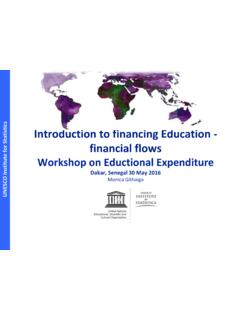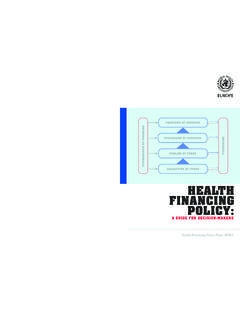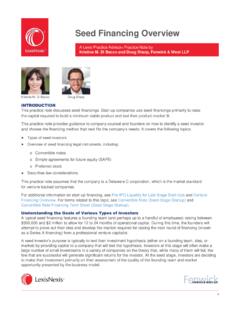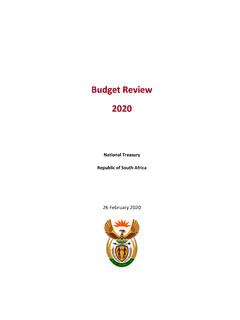Transcription of Impact of Globalization on Higher Education: An Empirical ...
1 International education Studies Vol. 3, No. 4; November 2010 Published by Canadian Center of Science and education 73 Impact of Globalization on Higher education : An Empirical Study of education Policy & Planning of Design education in Hong Kong Yan Yan Lam Department of Design Foundation Studies, Hong Kong Design Institute Room B1041, HKDI, 3 King Ling Road, Tseung Kwan O, NT, Hong Kong Tel: 852-3928 2948 E-mail: Abstract This paper focuses on the Impact of Globalization in the domain of Higher education , particularly, design education . It reviews how Globalization may affect educational policy and planning in Hong Kong by drawing on an Empirical study involving senior management, a course leader and a design trainer/facilitator.
2 This paper not only illustrates the challenges of Globalization to education sectors worldwide, but also brings the merits of Globalization in education to the fore and considers the challenges that it presents to multidimensional phenomena. The diversity of curricula; professional mobility; accountability and quality remain as parts of a continuing dialogue in the context of the global community. Research into these issues could trigger and influence thinking on how local design education (in the tertiary and Higher education sectors) might be restructured to satisfy educators hopes and desires for an ideal future in which design is promoted as being more imaginative, innovative, and eliciting wider responses to ideas, experiences, feelings, emotions, and intercultural cooperation in a globalizing world in both developed and developing nations.
3 Rich data were collected through a series of individual interviews with design students, teaching staff and design practitioners together with a focus group discussion with key members of a curriculum planing team. This data were analyzed with reference to current literature on Globalization , education reform and course planning strategy. The author was inspired by the fact that Globalization drives changes in education towards global perspectives. However, institutions, society, stakeholders and the public, as well as governments in this global world, should be sharing the goal of ever-increasing excellence in teaching combined with concern for local and global contexts. The Impact of Globalization on education (design education ) is a subject of debate and discourse within the whole global community.
4 Keywords: Globalization , education Reform, Curriculum, Design education , Higher education , Lifelong Learning, Hong Kong 1. Introduction This paper covers the essential elements of Globalization in a coherent and detailed discussion of the theoretical background, definitions and the Impact on education in general Higher education specifically. The paper interprets the Impact on education and pays special attention to transnational education , lifelong education , education reform, and the areas of changes in design education in the future. The discussion and interpretation are rounded off by the author s own Empirical observation, study and experience of specific dimensions of the Impact of Globalization on the education sector in Hong Kong.
5 In particular, these observations and experiences are concerned with the application of a broad theoretical concept to a concrete situation covering education management, course planning, pedagogical approach, accountability, quality, accreditation and funding. The study depicts that, inevitably, the international recognition of diplomas and degrees, and a balanced curriculum of core knowledge and competencies and technology, along with teaching profiles, are all areas that will be platforms for future opportunities and developments in all aspects of education in the integrated knowledge-driven community. 2. What is Globalization ? Globalization in a Complex Context Globalization is the buzzword of the decade.
6 It is a generic term which has reached into every corner of society. It is not easy to ascertain (Burbules et al. 2000) what is at stake in the Globalization issue, the functions that the term actually serves, and its consequences for contemporary theory, policy, and critical pedagogy. McBurnie commented (Uvali c-Trumbi c, 2002) that Globalization raises new issues and throws a new light on some old issues which indicate the necessity for changes in how the Higher education community thinks of itself in the global context and in how it shares problems and collaborates in the search for solutions. This concept is International education Studies Vol. 3, No. 4; November 2010 ISSN 1913-9020 E-ISSN 1913-9039 74explained further by Blackmore et al.
7 (2007). They suggested that Globalization has become an ideological discourse that drives change and that there is a perception of urgency in the need to respond to a new world order in which the old forms are not dead but the new forms are not yet fully fledged. In this respect, Held (1995) in his Democracy and Global Order , described a new Global Middle Ages , a period reflecting that while nation-states still have some vitality, they cannot control their borders and are therefore subject to all sorts of internal and external pressures. In the light of the evolving pressures of Globalization in education , McBurnie indicated (Uvali c -Trumbi c ,2002) that two of the key goals identified by the September 2001 meeting of experts under the auspices of UNESCO were to promote education as public good , and to promote quality assurance beyond national borders.
8 Nevertheless, Kellner (1995) defined Globalization as a multivalent term that can be described either positively or negatively. It must be seen as a complex and multidimensional phenomenon that involves different levels, flows, tensions, and conflicts, and has to be described in terms of the highly complex and multidimensional processes in economy, policy, culture, education , and everyday life. This concept was extended by Held and McGrow (2003), who suggested that Globalization can also refer to those spatio-temporal processes of change which underpin a transformation to an organization or to everyday life by linking and expanding human activities across regions and continents. In this sense, Globalization implies connections across frontiers which are not just occasional or random, but rather are regularized.
9 Suzuki (2003) agreed that it is difficult to define Globalization in a decisive term, but it may deviate sharply from previous various approaches to organizing the economy. He utilised Leslie Sklair s useful typologies to elaborate his point of view further. According to Sklair (1998), there are multiple ways of understanding or approaching the notion and image of Globalization . These include the world-system approach, global culture approach, global society approach and global capitalism approach. From the above studies, theorists find that Globalization has been involved in a fundamental restructuring and reorganization of the world economy, policy and environment in a complex context (Brown, 1999).
10 Globalization also brings with it a global awareness of the planetary perspective and enlarges our senses of time and space, which implies a greater sense of community within this global environment (Giddens, 1999). However, Burbules et al. (2000) defined Globalization as a certain loss of nation-state sovereignty, or at least the erosion of national autonomy, and correspondingly a weakening of the notion of the citizen as a unified and unifying concept, a concept that can be characterized by precise roles, rights, obligations and status. According to many theorists, we live in an age in which Globalization is the defining concept, while others find claims that it is a discourse that takes advantage of the historical processes of Globalization in order to valorize particular economic prescriptions about how to control the economy, through free trade, deregulation and the like (Hirst et al.)















